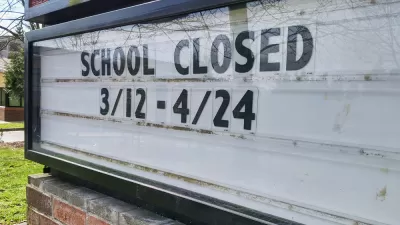In light of last week's incomprehensible tragedy in Colorado, Richard Florida prefaces the inevitable rekindling of the country's debate on gun rights by mapping gun violence at the state level and exploring its correlating factors.
Florida, and colleague Zara Matheson at the Martin Prosperity Institute, map the incidences of gun violence in America (including accidents and suicides) by state, based on the most recent data from the Centers for Disease Control and Prevention [PDF]. What they found was that Colorado's rate of deaths by firearms (10.3 deaths by per 100,000 people) was identical to the national average, somewhere between the state with the most, Alaska at 20.9 per 100,000, and the least, Hawaii at 3.1 per 100,000.
Florida also makes mention of some of his prior research on the factors and psychogeography associated with gun deaths. Of note if, as anticipated, gun laws become an issue in the current presidential campaign, Florida notes that his research found a correlation between state policies toward guns and gun ownership:
"Firearm deaths are significantly lower in states with stricter gun
control legislation. Though the sample sizes are small, we find
substantial negative correlations between firearm deaths and states that
ban assault weapons (-.45), require trigger locks (-.42), and mandate
safe storage requirements for guns (-.48)."
FULL STORY: The Geography of Gun Violence

Planetizen Federal Action Tracker
A weekly monitor of how Trump’s orders and actions are impacting planners and planning in America.

Maui's Vacation Rental Debate Turns Ugly
Verbal attacks, misinformation campaigns and fistfights plague a high-stakes debate to convert thousands of vacation rentals into long-term housing.

San Francisco Suspends Traffic Calming Amidst Record Deaths
Citing “a challenging fiscal landscape,” the city will cease the program on the heels of 42 traffic deaths, including 24 pedestrians.

Amtrak Rolls Out New Orleans to Alabama “Mardi Gras” Train
The new service will operate morning and evening departures between Mobile and New Orleans.

The Subversive Car-Free Guide to Trump's Great American Road Trip
Car-free ways to access Chicagoland’s best tourist attractions.

San Antonio and Austin are Fusing Into one Massive Megaregion
The region spanning the two central Texas cities is growing fast, posing challenges for local infrastructure and water supplies.
Urban Design for Planners 1: Software Tools
This six-course series explores essential urban design concepts using open source software and equips planners with the tools they need to participate fully in the urban design process.
Planning for Universal Design
Learn the tools for implementing Universal Design in planning regulations.
Heyer Gruel & Associates PA
JM Goldson LLC
Custer County Colorado
City of Camden Redevelopment Agency
City of Astoria
Transportation Research & Education Center (TREC) at Portland State University
Jefferson Parish Government
Camden Redevelopment Agency
City of Claremont





























